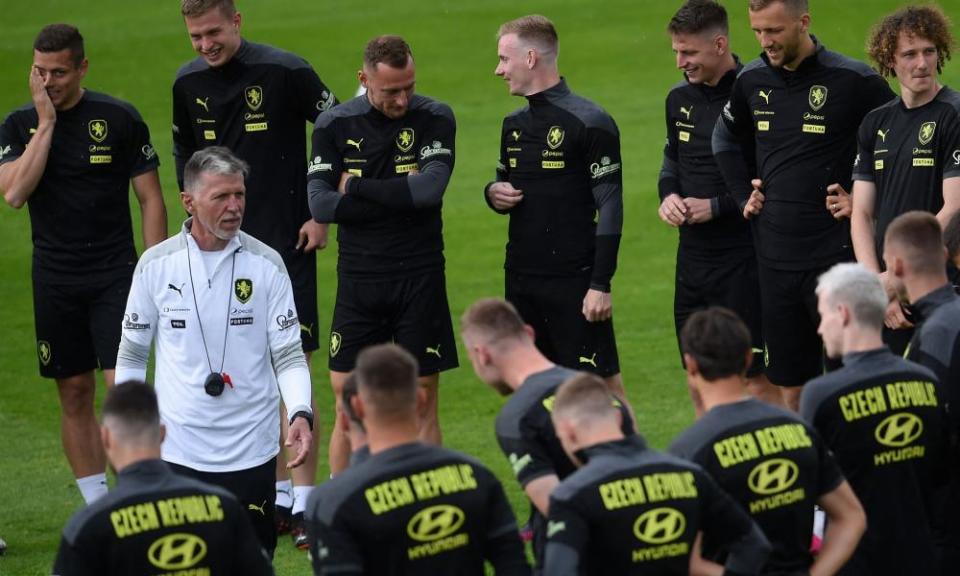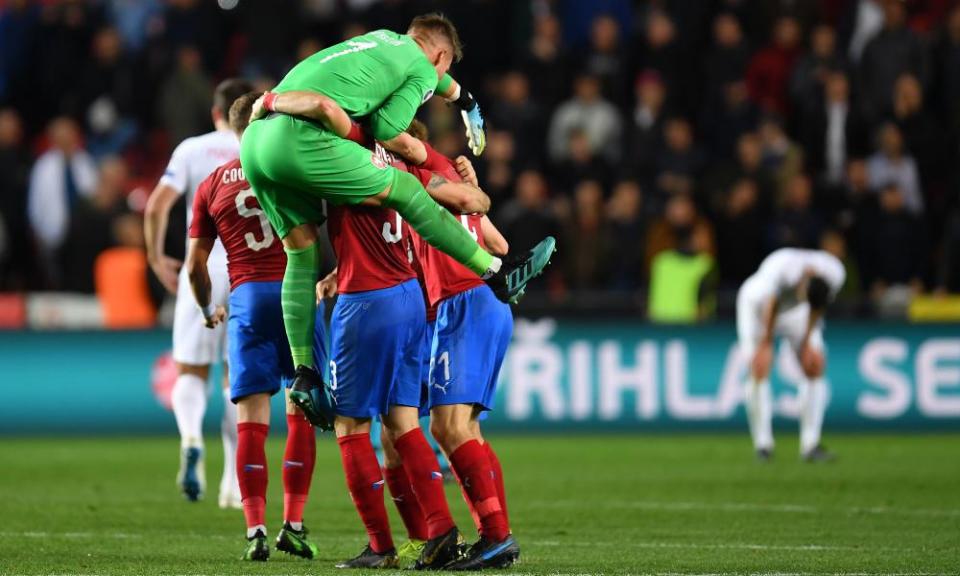Jaroslav Silhavy: ‘polite’ moderniser who has transformed Czech Republic

Jaroslav Silhavy saw it at close quarters. At Euro 2004, he was on the Czech Republic bench as Karel Bruckner’s assistant. The Czechs, with a “golden generation” of players led by Pavel Nedved, Tomas Rosicky and Petr Cech, lost in the semi-final to Greece in extra time. Silhavy remembers the anguish when the ball hit Cech’s net.
Silhavy – who had a reputation as an eternal assistant – leads the Czech Republic now. After more than two decades in coaching, he will appear at a big tournament in the main role for the first time.
Related: Euro 2020 team guides part 14: Czech Republic
Since he took over in 2018, the Czech Republic have emerged from a crisis to become one of Europe’s most dangerous sides, and the hope at home is that Silhavy can lead them through a tough group with England, Scotland and Croatia. They open against Scotland at Hampden Park on Monday.
In the 90s Silhavy was among the Czech league’s biggest personalities. He holds the record for top-flight appearances (465), captained Cheb, Drnovice, Zizkov and Slavia Prague, and had a reputation as an uncompromising defender. After he tore an achilles in 1999, he went into coaching.
Mocked by part of the media as “Rozcvickar” (the guy who leads the warm-up), Silhavy had the best possible coaching education during six years as Bruckner’s right-hand man. Bruckner was a renowned tactician who led one of the best teams in the country’s history, and Silhavy did far more than the warm-up: he analysed opponents, planned training sessions and scouted players. “I tried to devour everything Bruckner did,” he said.
Bruckner had earlier made Silhavy his captain at Drnovice. “He had amazing character and morale,” Bruckner said. “‘Jarda’ was an honest and tender soul, but on the pitch he was tough.”
As a young boy in the village of Chotesov, Silhavy played football in the summer, and in the winter he made an ice rink with friends and played hockey. The four international caps he won were beyond a dream. “For me, it was really a big thing when I put on an old Chotesov shirt,” he said.

As a coach, Silhavy did not have his contract at Ceske Budejovice renewed in 2011 because the club felt he was too soft with players. He then surprisingly won the league with Slovan Liberec in 2012 and later led them to the Europa League knockout stages. Another title followed with Slavia in 2017, secured in style, unbeaten for 36 games. But when Silhavy lost in Champions League qualifying and crashed out in the Europa League’s group stage, he was sacked. One year later, he found a dream job: as the Czech Republic’s head coach.
Silhavy came in after the team had lost 5-1 against Russia, the biggest loss since independence. He has changed the side completely. It was a hard task and the start to Euro qualifying was far from convincing. At Wembley, the Czechs lost 5-0 against England, despite relying on a packed defence.
He talked with the team’s leaders and realised he had to use the squad’s strength. Silhavy started relying on possession and a patient buildup, while asking the side to be quick and direct when possible. In his preferred 4-2-3-1, Silhavy’s team became hard to beat. They conceded only six goals in the remaining seven games, beat England 2-1 and qualified comfortably. They also won their Nations League group and drew 1-1 at the start of the World Cup 2022 qualifying with Belgium, whose manager, Roberto Martínez, described them as a “modern team”.
The backbone of his team played together at Slavia, including the left-back Jan Boril, right-back Vladimir Coufal, and midfielders Tomas Soucek and Alex Kral. Coufal and Soucek are at West Ham, and Kral moved to Spartak Moscow in 2019 but has been rumoured to be on the Hammers’ radar. Silhavy requires hard work and clever movement from his players and the Czechs, thanks to their willingness to run, are dangerous against more fancied opponents. Bayer Leverkusen’s Patrik Schick poses a big threat in the attack.
Silhavy replaced a tough disciplinarian, Karel Jarolim, and decided to relax the team, too. “I allowed players to drink a beer on the first evening, of course with moderation,” he said. “We sat down before the game against Slovakia, had a beer and talked.” The Czechs won and he has built a strong relationship with his players.
Related: Tomas Soucek: Czech Republic’s marathon man ready for big stage
In the past, it led to accusations of being too soft. “Somebody says ‘soft’ when in reality it’s polite,” he said. “I think I’m a polite coach … I think players are my partners, not my subordinates.”
In the dressing room, communication and trust are key. “Players perceive if the coach is fair or not,” Silhavy said. “If he is, they follow him.” Ondrej Kusnir, who played for Silhavy at Liberec, said: “If he thinks that somebody is out of form, he will talk with him and let him relax for one or two games. He wants players with character. He is a great psychologist. He knows when to raise his voice and how to treat every player.”
Euro 2020 is the stage Silhavy deserves. Usually nervous before big games, he was reminded of the tournament every time his small granddaughter came to visit. “She rushed to the special calendar which showed how many days there are until the start of the tournament,” he said. “She would say: ‘Grandpa, you forgot, we have to delete this one.’ She controls me.”

 Yahoo Sport
Yahoo Sport 





































